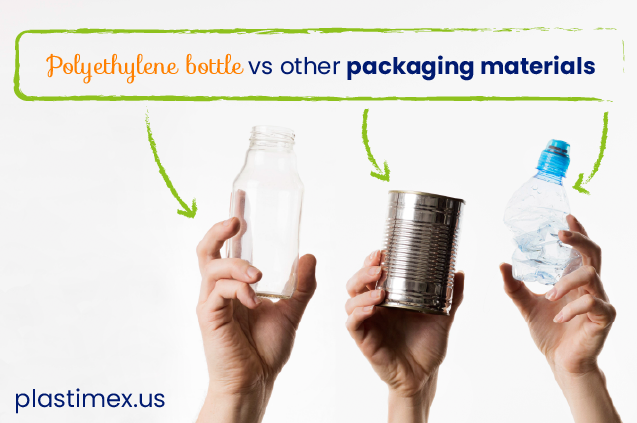In a scenario where product safety is a crucial aspect for consumers, the choice of packaging material becomes a strategic decision for any brand looking to position its product in the market. In this blog, we will explain why the polyethylene bottle represents an exceptional solution, surpassing the limitations of traditional materials like aluminum and glass, and redefining excellence standards in the packaging industry.
Aluminum or Glass?
While aluminum and glass also have their advantages, it is important to highlight the key differences.
Aluminum
- Weight: Aluminum bottles are lighter than glass ones but are still heavier than polyethylene bottles. This weight difference can significantly influence the efficiency of product packaging transportation and storage, as well as associated costs.
- Recycling: While aluminum recycling is efficient and contributes to sustainability, it’s important to note that the initial production process of aluminum is more energy-intensive than that of polyethylene, which can have a greater environmental impact in its initial phase.
- Durability: Despite its relative lightness, aluminum is prone to denting easily, which can affect the integrity of the packaged product and its aesthetics. This fragility can be a significant consideration in environments requiring robust protection for contents.
Glass
- Weight: Glass bottles are considerably heavier than aluminum and polyethylene bottles. This higher density can result in higher shipping and storage costs, as well as a greater environmental impact due to additional energy consumption during transportation.
- Recycling: Although glass is highly recyclable, the recycling process may require more energy and resources compared to polyethylene. However, recycled glass is often used in manufacturing new bottles, reducing the demand for raw materials.
- Durability: Glass is fragile and can break easily if dropped or bumped. This fragility can be a disadvantage in applications where durability and product protection are essential, as a damaged glass bottle can affect the quality and safety of the packaged content.
Polyethylene bottle: A Versatile Solution
Polyethylene bottles are known for their versatility and effectiveness in protecting the products they contain. Here are some key reasons why polyethylene bottles stand out compared to other packaging materials:
- Lightweight: Polyethylene bottles are significantly lighter than glass and aluminum bottles. This lightness not only facilitates transportation and storage but also reduces the carbon footprint by lowering shipping costs and CO2 emissions.
- Excellent Strength: Unlike glass and aluminum, polyethylene is a highly durable material. This means that these bottles can withstand bumps and drops without breaking, which is essential in environments where durability is crucial.
- Sustainability: Polyethylene recycling is an efficient process that reduces the amount of plastic waste in the environment and promotes a circular economy.
- Easy Customization: Polyethylene bottles are highly customizable, allowing for packaging that meets the specific needs of your product, from different sizes and shapes to customized labeling and caps.
Plastimex stands out as a leader in the manufacturing of polyethylene bottles due to its commitment to quality, sustainability, and versatility. If you are looking for a packaging material that combines durability, efficiency, and customization, the polyethylene bottle is the ideal choice. Consider the positive impact it can have on your business and the environment by opting for high-quality plastic packaging.

